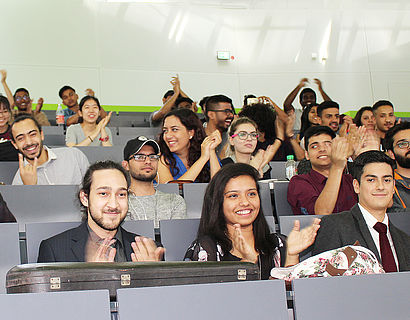Key facts
|
Degree |
Bachelor of Engineering |
|---|---|
|
Language of instruction |
German |
|
Modes of study |
full-time, part-time |
|
Standard duration |
7 semesters |
|
Programme start |
winter semester |
|
Fees |
no tuition fees (the university only charges semester fees each semester) |
|
Application deadlines |
|
|
Faculty |
Study objectives
The Logistics degree programme trains graduates to understand the economics and administrative tasks in the core field of Logistics and Supply Chain Management, as well as closely related areas. The degree programme is semi-technical and provides students with attractive, relevant and future-oriented skills in the field of logistics using modern teaching methods and in integrated context with other degree programmes.
Graduates will have the skills to solve problems in logistics at the interface between engineering sciences, business administration and information technology in an integrative and cooperative way. This means they can think like an engineer with a systematic approach, apply quantitative methods and models, and use these to solve practical problems as well as communicate easily with technical experts from a range of fields. Their abilities will be primarily useful in the efficient operation, analysis and improvement of existing logistics solutions in the area of Supply Chain Execution.
Course contents
- Goods transport networks, material flow systems, business control systems (e.g. SAP)
- Varied group work with presentation of results
- Project work within companies
- Visits to companies and trade fairs
- Guest talks by economics experts
Programme modulesOpen areaClose area
Module
1st semester
Mathematics 1
Introduction to Informatics 1
Basics of Logistics and Supply Chain Management
Fundamentals of Operational and Corporate Management
Methodology and Communication
English for Logistics
2nd semester
Statistics
Engineering Fundamentals
Introduction to Informatics 2
Materials Handling Technology
Quantitative Methods in Business Administration
3rd semester
Mathematics 2
Introduction to Database Systems
Planning of Logistics Systems 1 - Analysis
Production Logistics
ERP 1 - Basics
Telematics in Logistics
5th semester
Freight Transport Logistics
Planning of Logistics Systems 2 - Design
Economics and Macrologistics
Specification of Technical Systems
Legal Aspects for Logisticians
Quality Management
6th semester
Logistics Management
ERP 2 - System Integration
Transport Chains and Networks
Logistics Projects in Companies
elective module 1
7th semester
elective module 2
Career opportunitiesOpen areaClose area
There is a wide range of opportunities in logistics. Logistics specialists can therefore be very creative in their choice of career. You can focus on the specific area that interests you and pursue this in your career. But it is also possible to find a position that requires the entire scope of your course contents. Common career options differ broadly in their source: Logistics specialists are required as full time staff by many companies, but they also work as project consultants for companies. A few example positions:
- Purchasing/material procurement, controlling, sales
- Production planning and control, information technology
- Engineering material flow components
- Transport and logistics
The two core messages for logistics students: There are excellent prospects for getting an interesting job immediately after graduation. The average salary is significantly higher than for graduates of other fields of study.
Admission requirements and applicationOpen areaClose area
General admission requirements
Specific admission requirements
Language skills: To be admitted to this degree programme, overseas applicants must possess sufficient German language skills. This may be demonstrated with an overall grade of DSH-2 or better from the Deutsche Sprachprüfung für Hochschulen (DSH) language exam.
Application
You can apply to TH Wildau online. All the information you need to apply can be found on our central application page.
Preparation courses
We recommend checking in good time as to whether it is useful for you to participate in study preparation courses (in German) prior to commencing your studies. Online tests in the subjects of mathematics, physics and information technology will help you come to a decision. Prior knowledge in these subjects is an important basis for various study modules and therefore necessary for the success of your studies in light of past experience.




